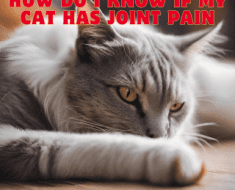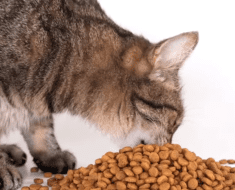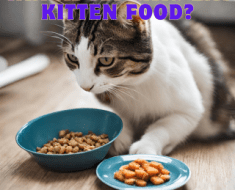Your cat may be throwing up undigested food due to eating too quickly or having a sensitive stomach. Various health issues could also be the cause.
Understanding why your cat is vomiting undigested food is crucial for their well-being. Rapid ingestion can cause cats to vomit their meals shortly after eating. Sensitivities to certain foods, or changes in diet, can also lead to stomach upset. Beyond these relatively benign reasons, health concerns such as digestive tract issues, parasites, or even more serious conditions like diabetes or thyroid problems might be underlying factors. 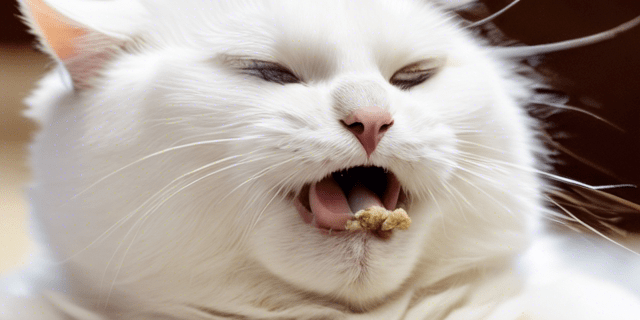
Cat owners need to observe their pet’s eating habits and overall health. A vet visit is essential if vomiting persists, as early diagnosis and treatment can prevent more serious complications. By ensuring a proper feeding routine and diet, as well as staying alert to any signs of ill health, you can help maintain your furry friend’s digestive health.
Reasons For Cat Vomiting Undigested Food
Cats throwing up undigested food can be a sign of eating too quickly or digestive issues. A trip to the vet is warranted if this behavior persists, ruling out underlying conditions.
Cats might seem mysterious in their habits, but when they start throwing up undigested food, it’s a clear sign that something’s off. This may seem alarming, but often, the reason for this can be pretty straightforward. Understanding why your feline friend is vomiting undigested food can help you seek the right treatment and prevent future occurrences.
Gastrointestinal Issues
Sometimes the cause of vomiting in cats is related to their gastrointestinal tract. This might include:
- Inflammation: Conditions like gastritis or enteritis cause inflammation of the stomach lining, which prevents proper digestion.
- Infections: Bacterial or viral infections can disrupt the stomach’s functioning, leading to vomiting shortly after eating.
- Obstructions: If a foreign object is ingested, it can block the passage of food through the digestive system, causing regurgitation.
Eating Too Quickly
- Behavioral causes: Some cats may eat too fast out of habit or competition with other pets, swallowing air and food without chewing properly.
- Physical effects: Rapid eating can lead to the stomach filling too quickly, triggering a vomit reflex before digestion occurs.
Food Intolerance Or Allergies
Much like humans, cats can develop intolerances or allergies to certain ingredients in their diet.
- New foods: Introducing a new diet can lead to intolerance if the cat’s digestive system doesn’t agree with the ingredients.
- Allergic reactions: Certain proteins or additives might trigger an immune response that causes the cat to vomit undigested food as a way to expel the irritant.
Overeating
When a cat consumes more food than its stomach can handle, vomiting is often the body’s way of alleviating discomfort.
- Portion sizes: Serving larger portions than necessary can encourage overeating.
- Free-feeding: Having constant access to food might lead some cats to eat excessively, causing stomach distress.
Parasites
Parasites living in the digestive tract can certainly upset a cat’s stomach, leading to regurgitation of undigested food.
- Intestinal worms: Conditions like roundworm or tapeworm infestations can interfere with proper digestion and nutrient absorption.
- Protozoa: Microscopic parasites, such as giardia, can cause symptoms including vomiting and diarrhea.
Underlying Medical Conditions
Sometimes, the cause of vomiting might be rooted in more serious health issues.
- Kidney disease: Compromised kidney function can lead to a buildup of toxins in the body, which in turn might cause vomiting.
- Hyperthyroidism: An overactive thyroid gland can speed up metabolism, affecting digestion and resulting in vomiting.
Caring for a cat that’s throwing up undigested food can be a troubling experience, but understanding these potential reasons is the first step towards getting your furry friend the help they need. If vomiting persists, it’s crucial to consult with a veterinarian who can provide a precise diagnosis and the appropriate treatment plan.
Your cat’s health is important, and timely attention to issues like vomiting can make a significant difference in their well-being.
Common Causes Of Cats Throwing Up Food
Cats often vomit undigested food due to hasty eating or dietary indiscretions. Sudden changes to their diet or sensitivities to certain foods can also disrupt their digestion, leading to regurgitation.
Understanding the reasons behind your feline friend’s behavior of regurgitating their meal can be concerning. When cats throw up undigested food, it may be easy to jump to conclusions about their health. Yet, several common causes might explain why this is happening.
Let’s dive into some of these possible explanations
Eating Too Quickly
Cats that eat too rapidly can end up vomiting their food soon after mealtime. Their voracity can lead to:
- Swallowing air: This often results in discomfort and an expulsive reaction.
- Inadequate chewing: Larger chunks of food that are swallowed whole can be harder to digest.
Dietary Issues
Like humans, cats may also experience adverse reactions to certain foods or abrupt dietary changes. Some dietary factors include:
- Food intolerance: Specific ingredients can irritate a cat’s stomach, leading to vomiting.
- Sudden shifts in their diet: A rapid change in food type or brand might upset your pet’s digestive system.
- Poor food quality: Lower-quality or expired foods can be hard to digest or may contain irritating substances.
Understand that what your cat consumes is as crucial as how they consume it. Monitoring their eating habits and ensuring a gradual introduction to new foods can help prevent vomiting due to dietary pitfalls.
Hairballs
The grooming process for cats is a ritualistic affair that sometimes has the side effects of:
- Accumulating hair in the digestive tract: As cats groom, they ingest hair that can form hairballs, which they may later vomit.
Regular brushing and specific diets may help minimize hairball formation and hence, the associated vomiting.
Health Concerns
It’s essential to consider that underlying health conditions could also be a reason for your cat’s expulsive behavior. Several health issues to note are:
- Parasites: Infestations can disrupt the digestive process.
- Digestive disorders: Conditions like gastroenteritis or inflammatory bowel disease can lead to vomiting.
- Organ dysfunction: Problems with organs such as the liver or kidneys can manifest in symptoms like vomiting.
Make sure to consult a veterinarian if your cat’s vomiting is frequent or accompanied by other signs of distress. Their professional assessment is crucial in ruling out more severe concerns. While addressing the issue, remember that these points are just starters in understanding possible causes.
How To Prevent Cats From Vomiting Undigested Food
Understanding why your cat is throwing up undigested food is crucial for their health. Smaller, more frequent meals can ease digestion and reduce vomiting. Consulting a vet to rule out underlying conditions is also essential for prevention. 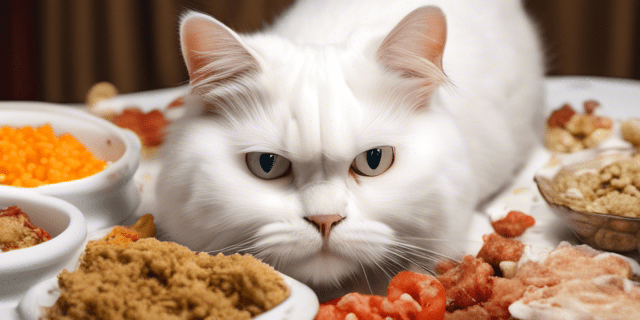
Cats are mysterious creatures, and their behaviors often leave us puzzled, especially when they start exhibiting signs of distress like throwing up undigested food. This unpleasant experience can be concerning for any cat owner, but there are practical ways to prevent this from happening to your feline friend.
Understanding Your Cat’s Eating Habits
Cats have unique eating patterns, and sometimes these can contribute to vomiting. A few adjustments in their diet and feeding routine might make a significant difference:
- Smaller, More Frequent Meals: Cats are natural grazers who do better with access to small amounts of food throughout the day rather than one or two large meals.
- Slow-Feeding Bowls: These are specially designed to make cats eat more slowly and work a little harder for their food, thus preventing them from gulping their meal too quickly.
- Elevated Feeding Station: Raising your cat’s food bowl can help improve their digestion and lessen the likelihood of throwing up after eating.
Spotting And Managing Hairballs
Sometimes, the issue isn’t with the food but with the hair your cat ingests while grooming. Dealing with hairballs is a necessary part of preventing vomiting:
Hairballs are a common cause of vomiting in cats. While it’s a natural occurrence for them to ingest hair during grooming, excessive hairball buildup can lead to bouts of vomiting. To manage this issue:
- Regular Grooming: Brush your cat’s coat frequently to reduce the amount of hair they ingest.
- Hairball Control Diet or Supplements: There are specially formulated foods and products that can help reduce the formation of hairballs in your cat’s digestive system.
Monitor And Modify Their Diet
Remember that what your cat eats plays a pivotal role in their overall health, and sometimes, vomit is a sign of dietary intolerance or sensitivity.
Finding the right food for your cat often involves a bit of trial and error. Here’s what to consider:
- High-Quality Ingredients: Make sure your cat’s food is composed of high-quality, easily digestible proteins and is appropriate for their life stage.
- Gradual Changeover: If you’re introducing new food, always do so gradually over a week or so, to prevent gastrointestinal upset.
- Consultation With a Vet: Speak with your vet if you suspect your cat’s vomiting may be related to their diet. They might recommend an elimination diet to pinpoint any allergies or sensitivities.
Following these guidelines, closely observing your cat, and maintaining regular veterinary check-ups can help you ensure that your cat stays healthy and happy, minimizing the chances of them bringing up their last meal unexpectedly. Remember to keep a close eye on your cat’s behavior and eating patterns, as these can provide insightful clues to their well-being.
With the right approach, you can reduce or eliminate your cat’s instances of throwing up undigested food and increase their comfort and quality of life.
Is It Normal For Cats To Regurgitate Food?
Regurgitation of undigested food in cats can occasionally be a normal behavior, especially if they’ve eaten too quickly. Concern arises when it becomes a frequent occurrence, signaling potential health issues that require a veterinarian’s attention. 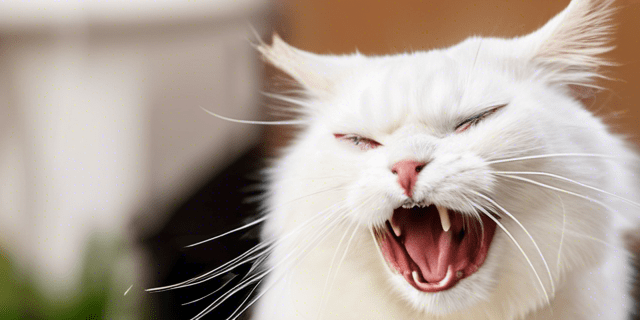
Discovering your cat has regurgitated can certainly be alarming, but it’s essential to distinguish between vomiting and regurgitation. Whether this behavior is normal is dependent on the circumstances and frequency.
- Occasional regurgitation: It is not unusual for cats to regurgitate their food occasionally. This may happen if they’ve eaten too quickly or have engaged in vigorous activity after eating.
- Type of food: Cats might regurgitate if they struggle with a certain type of food, whether it be due to size, shape, or a specific ingredient they may have sensitivity to.
- Regurgitation vs. Vomiting: Unlike vomiting, which involves stomach muscle contractions and often comes with signs of illness, regurgitation usually occurs soon after eating and the food appears undigested.
Observing occasional regurgitation isn’t a major cause for concern. Frequent occurrences or changes in behavior, however, should prompt a visit to the veterinarian to rule out any underlying health issues.
When To Consult A Veterinarian
It’s paramount to be vigilant about your cat’s health. Monitoring the frequency and nature of regurgitation can help in determining whether it’s a minor issue or something that requires medical attention.
Here’s a list of situations that warrant a trip to the vet:
- Persistent regurgitation: If your cat regurgitates undigested food consistently, particularly for 24 hours or more, it may indicate a health problem.
- Signs of distress: Look out for symptoms like lethargy, changes in appetite or water consumption, or any signs of abdominal pain.
- Associated symptoms: The presence of blood in the regurgitated food, or any accompanying symptoms such as diarrhea, should be checked by a vet immediately.
Understanding your cat’s normal behavior and eating habits will serve as a crucial benchmark for noticing any health-related changes. Monitoring their well-being and consulting a veterinarian when things seem amiss is a testament to responsible pet ownership.
When To Be Concerned About Cat Vomiting Undigested Food
Occasional cat vomiting might not signal alarm, but persistent ejection of undigested food warrants a vet visit. Digestive issues or dietary intolerance could be underlying causes needing immediate attention to ensure your feline’s health is not at risk.
Discovering your cat’s vomit can be worrying, especially when it’s undigested food. Although occasional vomiting might not signal anything serious, certain scenarios do call for prompt veterinary attention.
Persistent Vomiting
If your cat is vomiting frequently, it could indicate a more serious health concern. Your beloved feline companion may be dealing with:
- Gastrointestinal issues: Such as inflammatory bowel disease, which prevents proper digestion and absorption of food.
- Parasitic infections: Parasites like roundworms can interrupt the normal digestive process, leading to vomiting.
- Dietary indiscretion: Cats who eat too quickly, or consume inappropriate food, may regurgitate undigested meals.
Changes In Behavior Or Appearance
Subtle alterations in your cat’s daily behavior or physical condition can be red flags:
- Lethargy: A lethargic cat paired with vomiting is a worrisome combination and can point to an underlying health issue.
- Weight loss: Sudden weight loss in conjunction with vomiting suggests your cat is not retaining the nutrients from its food.
- Dehydration: If your cat’s skin lacks elasticity or if its gums are tacky, dehydration due to vomiting could be the culprit.
By assessing these signs, you can determine when a problem is brewing beyond the occasional hairball or upset stomach. Always err on the side of caution and consult with a veterinarian if your cat presents with these worrying symptoms.
Dietary Adjustments For Cats With Frequent Vomiting
Frequent vomiting in cats, especially of undigested food, could signal dietary issues that need attention. It’s crucial to evaluate their food quality, meal frequency, and portion sizes. Consulting with a vet to pinpoint the cause and adjust their diet can help soothe your feline’s tummy troubles.
Witnessing your feline friend suffer from vomiting can be distressing, especially when it involves undigested food. This could indicate that it’s time to reevaluate your cat’s diet to ensure they’re not only eating properly but that their body is absorbing the nutrients they need efficiently.
Adjusting what they eat, and how they eat it, can sometimes make all the difference.
Assessing Your Cat’s Current Diet
Before making any dietary changes, it’s crucial to take a close look at what your cat currently consumes. This will be your baseline from which you can start tweaking their diet to better suit their needs. Factors such as the type of food, the quality, and the presence of any potential allergens or ingredients that may be difficult to digest need to be considered.
Introducing Dietary Changes Gradually
- Altering your cat’s diet abruptly can cause further gastrointestinal upset:
To avoid this, implement any changes to your cat’s diet over days, blending increasing amounts of the new food with the old.
- Identifying and eliminating problem ingredients:
If you suspect certain ingredients are causing your cat’s vomiting, try switching to a limited-ingredient diet to pinpoint the culprit.
Choosing The Right Food For Your Cat
Selecting the correct type of food for your cat is essential. High-quality, easily digestible ingredients are key. Look for options that list real meat, fish, or poultry as the first ingredient. Grain-free formulas can also be beneficial for some cats, particularly if grains are suspected to be a difficult-to-digest component causing vomiting.
Splitting Meals Into Smaller, More Frequent Portions
- Reducing meal sizes:
Giving your cat smaller portions can help prevent overeating and vomiting. When a cat consumes too much too quickly, it may come back up.
- Regular feedings throughout the day:
Spacing out meals can keep your cat’s stomach from becoming too full and reduce the risk of vomiting. An automatic feeder can be handy for this.
Making dietary adjustments for a cat that often vomits undigested food requires patience and attention to detail. With carefully selected food and feeding practices, you can help manage your cat’s discomfort and improve their overall well-being. Remember to always consult with a veterinarian before making significant changes to your cat’s diet, especially if vomiting persists, as it may signal a more serious health condition.
Medical Conditions Associated With Cat Vomiting Undigested Food
Frequent cat vomiting of undigested food may indicate underlying health issues such as dietary intolerance, parasites, or hastened eating habits. It’s critical to observe your pet and consult a veterinarian to pinpoint the root cause and ensure proper treatment.
Gastrointestinal Obstructions
A common medical issue that may cause your cat to vomit undigested food is a blockage within their gastrointestinal tract. Objects such as toys, strings, or hairballs can lodge themselves in your feline friend’s digestive system, preventing proper food passage.
Digestive Disorders
Various digestive disorders can lead to your cat’s inability to process and assimilate food correctly:
- Inflammatory Bowel Disease (IBD): A condition characterized by chronic irritation and inflammation of the gut.
- Colitis: Inflammation of the colon that often causes discomfort and an urgent need to eliminate.
- Gastritis: An inflammation, irritation, or erosion of the stomach lining that can disrupt digestion.
Metabolic Diseases
Disorders affecting your cat’s metabolism can interrupt the normal processing of food, resulting in vomiting:
- Diabetes: High blood sugar can lead to a range of complications, including gastrointestinal issues.
- Hyperthyroidism: An overactive thyroid gland speeds up metabolism, potentially impacting digestion.
- Kidney Disease: Impaired kidney function may lead to toxin build-up in the system, affecting overall health including digestion.
Infectious Diseases
Cats are susceptible to various infections which might explain the abrupt ejection of their meal:
- Viruses: Feline Panleukopenia, Feline Coronavirus, and others can disrupt your cat’s stomach.
- Bacteria: Bacterial infections in the stomach or intestines, such as Salmonellosis, can cause vomiting.
- Parasites: Worms or protozoa residing in the gut can cause discomfort and vomiting.
Addressing your cat’s health concerns early can prevent serious complications. If you notice ongoing or severe vomiting, consulting your vet is crucial. They can accurately diagnose the cause and recommend an appropriate treatment plan based on the medical condition at the root of the issue.
Keep an eye on your feline’s behavior and health, and always provide a comfortable and stress-free environment to help them thrive.
Home Remedies For Cat Vomiting Undigested Food
Discovering your cat vomiting undigested food can be unsettling. Immediate remedies often include fasting and hydration, but persistent issues warrant a vet consultation. Understanding the root cause is vital for your feline’s health.
Watching your cat suffer from vomiting can be distressing for any pet owner. Understanding why your cat is throwing up undigested food is essential so you can potentially provide home remedies. Here, we will explore some simple solutions you can attempt at home to help mitigate your feline friend’s discomfort.
Remember, while minor issues can often be resolved at home, persistent or severe symptoms should prompt an immediate visit to the veterinarian.
Adjust Feeding Practices
Before delving into remedies, it’s critical to consider if your feline’s vomiting could be due to overeating or eating too quickly. Altering how you offer food could provide a solution:
- Smaller, more frequent meals: Feeding your cat smaller portions several times a day can help reduce the likelihood of vomiting.
- Slow feeder bowls: These bowls make it more challenging for cats to eat quickly, allowing the stomach more time to process.
- Elevated feeding position: Raising the food bowl can sometimes help reduce vomiting by aiding the natural flow of food.
Herbal Remedies
Some natural herbs are revered for their soothing properties and can be gentle on your cat’s digestive system:
- Chamomile: Known for its anti-inflammatory properties, chamomile can settle an upset stomach.
- Ginger: A small amount of ginger can aid in digestion and help treat nausea.
- Slippery Elm: This natural supplement is often recommended for its ability to ease gastrointestinal distress.
Dietary Changes
Cats can develop sensitivities to certain types of food, leading to regurgitation. It’s important to identify if a dietary change is in order:
- Limited ingredient diet: Switching to a diet with fewer components can help you identify any food intolerances.
- Hypoallergenic food: Specialized cat food designed for sensitive stomachs may prevent vomiting.
- Gradual transition: Whenever you change your cat’s diet, do it slowly to avoid upsetting their stomach.
Encourage Proper Hydration
Keeping your cat well-hydrated is vital for overall health and especially important if they’ve been vomiting.
- Fresh water available: Always have clean, fresh water accessible for your cat.
- Wet food inclusion: Including wet food in their diet can boost their fluid intake.
- Water fountains for cats: Many cats prefer running water and may drink more if a fountain is available.
Stress Reduction
Stress can play a significant role in your cat’s digestive issues. Here are ways to minimize stress for your cat:
- Create a safe space: Ensure your cat has a comfortable, quiet place to retreat to when they feel overwhelmed.
- Stick to regular routines: Cats thrive on predictability; keeping a consistent schedule can alleviate stress.
- Interactive play: Engaging in daily play sessions can help reduce anxiety and promote a sense of well-being.
Each of these home remedies can help manage your cat’s symptoms. Nonetheless, it’s important to keep in mind that vomiting can be a sign of a more severe condition. If these approaches do not alleviate the problem, consulting your vet for further guidance is the best course of action.
Remember, your cat’s health always comes first, and while these suggestions might offer relief, professional veterinary advice is irreplaceable.
What Does It Mean When A Cat Vomits Whole Food?
A cat regurgitating undigested food can indicate a hasty eating habit or a deeper health issue. It’s essential to monitor your feline friend and consult a veterinarian for persistent episodes to ensure proper care and treatment.
Experiencing your cat throwing up undigested food can be worrying. It’s not just distressing for you but also uncomfortable for your furry friend. When this happens, it signifies that the food hasn’t been processed properly within their system—either it hasn’t reached the stomach or hasn’t stayed there long enough to break down.
Possible Causes For Vomiting Undigested Food
- Eating too quickly: Cats that gorge on their meals can end up vomiting because their stomachs cannot handle the sudden influx of food.
- Sensitive stomach: Some cats have stomachs that are easily upset by certain foods or dietary changes.
- Hairballs: These can disrupt the normal processing of food, leading to vomiting.
- Disease or illness: Conditions like inflammatory bowel disease or infections can prevent proper digestion, causing regurgitation.
Immediate Steps To Take
If your cat has thrown up undigested food, it’s essential to monitor their behavior and look for additional symptoms. Here’s what you can do:
- Observe your cat for any further vomiting or other signs of distress.
- Remove food and water for two hours to rest their stomach, then reintroduce water slowly.
- Consult a veterinarian if the vomiting persists or if your cat displays other concerning symptoms, such as lethargy, diarrhea, or changes in appetite.
Preventing Future Incidents
To help prevent future vomiting, consider the following steps:
- Slow feeder: Use specially designed bowls to slow down your cat’s eating pace.
- Smaller, more frequent meals: These can aid digestion and reduce the load on your cat’s stomach.
- Regular grooming: Particularly for long-haired breeds, to reduce the formation of hairballs.
- Diet review: Consult your vet to determine if a dietary change could help your cat’s stomach health.
Understanding the possible causes of your cat’s vomiting and taking appropriate steps can help ensure they stay as healthy and comfortable as possible. Always consult your veterinarian for advice and treatment to cater to your cat’s specific health needs.
Differentiating Between Regurgitation And Vomiting In Cats
Regurgitation in cats typically involves undigested food expelled without effort, often indicating a swallowed issue. Vomiting, on the other hand, usually involves retching and is a sign of digestive disturbances, necessitating a closer look at your cat’s health by a vet.
Cats bringing up undigested food can be unsettling, leading many pet owners to wonder about the cause. It’s essential to distinguish whether your feline friend is experiencing regurgitation or vomiting, as these are distinctly different processes and can have different implications for your cat’s health.
What Is Regurgitation?
Regurgitation in cats typically occurs not long after eating and offers clues to its root problem:
- Sudden onset: Unlike vomiting, regurgitation usually happens without any signs of nausea or heaving.
- Undigested food: The expelled material is often in the shape of a tube, mirroring the esophagus, and consists of undigested food.
- Less effort: Cats often regurgitate with little effort; it’s more of a passive process than the forceful ejection seen with vomiting.
- Possible causes: This may be due to issues like esophageal disorders, difficulty swallowing, or eating too quickly.
What Is Vomiting?
Vomiting is a more complex bodily reaction involving the stomach and sometimes the small intestine. Here’s how it differs:
- Preceded by drooling: Vomiting is often preceded by excessive drooling and retching, as the body prepares to expel substances from the stomach.
- Bile presence: Vomited material may contain bile, which is usually a yellowish-green color, indicating it is coming from the stomach.
- Evidence of digestion: Vomited content might show signs of being partially digested.
- Concerning signs: Frequent vomiting can lead to dehydration and should be a sign to consult your vet.
Understanding the differences between these two actions is crucial for determining whether a trip to the vet is necessary or if there might be a simpler explanation for your cat’s behavior. If you’re ever in doubt, err on the side of caution and have a professional evaluate your cat’s health.
Frequently Asked Questions For Why Is My Cat Throwing Up Undigested Food
Is It Normal For Cats To Throw Up Undigested Food?
Occasional vomiting of undigested food in cats is not unusual, but frequent occurrences may indicate a health issue that requires a vet’s attention.
When Should I Be Concerned About My Cat Throwing Up?
Be concerned if your cat vomits frequently, exhibits other symptoms like lethargy, or vomits blood. Persistent vomiting requires a veterinarian’s attention.
Why Is My Cat Vomiting But Acting Normal?
Your cat may be vomiting due to hairballs, dietary indiscretion, or ingesting something toxic. Keep an eye on their behavior and consult a vet if vomiting persists.
How Do I Get My Cat To Stop Throwing Up After Eating?
Feed your cat smaller, more frequent meals to ease digestion. Ensure they eat slowly by using a puzzle feeder. Avoid sudden dietary changes, and choose easily digestible food. Monitor for possible food allergies. If vomiting persists, consult a veterinarian for advice and treatment.
Why Is My Cat Vomiting Undigested Food?
Cats may vomit undigested food due to several reasons including eating too quickly, dietary indiscretion, or even underlying health issues such as food allergies or sensitivities.
Conclusion
Understanding your cat’s health can be challenging, yet it’s crucial to be vigilant. If your feline friend vomits undigested food, consider diet changes, meal frequency adjustments, and stress factors. Always consult a vet for persistent issues. Keeping cats happy and healthy is our shared goal.
Remember, early intervention can make all the difference!

